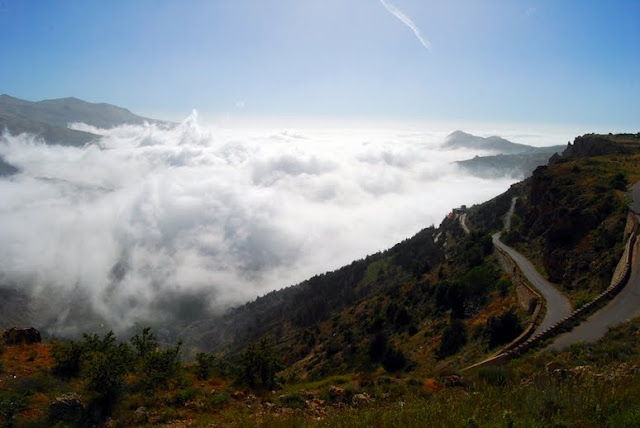 |
| Overlooking the town of Bucharre, Qadisha Valley Lebanon |
“I have to stop and adjust my bag. It is unbalanced and there is something hard poking my back!”
Rummaging through my day-pack, I find the culprit: a bag of cucumbers I brought along as part of a picnic lunch spread.“Hahahahaha!” Laurence bursts out laughing hysterically. “Now that you are no longer being raped by a cucumber, can we move on?”
After almost two months traveling through the arid deserts from Egypt to Syria, a few days of hiking in the Qadisha Valley of Lebanon is a welcome change! Here the area is covered by lush green forests, and the air feels fresher. All along the valley are thundering waterfalls and serene monasteries, set among fruit and olive groves. As this is a predominantly Maronite Christian area of Lebanon, the towering minarets and frequent Islamic call to prayers, typical in the rest of the middle-east, are replaced by soaring steeples and church bells. Red-roofed villages with quaint squares and outdoor cafes line the rim of a deep valley, giving the whole area the look and feel of a European alpine resort.
Rummaging through my day-pack, I find the culprit: a bag of cucumbers I brought along as part of a picnic lunch spread.“Hahahahaha!” Laurence bursts out laughing hysterically. “Now that you are no longer being raped by a cucumber, can we move on?”
After almost two months traveling through the arid deserts from Egypt to Syria, a few days of hiking in the Qadisha Valley of Lebanon is a welcome change! Here the area is covered by lush green forests, and the air feels fresher. All along the valley are thundering waterfalls and serene monasteries, set among fruit and olive groves. As this is a predominantly Maronite Christian area of Lebanon, the towering minarets and frequent Islamic call to prayers, typical in the rest of the middle-east, are replaced by soaring steeples and church bells. Red-roofed villages with quaint squares and outdoor cafes line the rim of a deep valley, giving the whole area the look and feel of a European alpine resort.
Staying in the town of Bcharré, most of the main sights of the valley, including the highest peak in Lebanon, trails to the valley floor, and one of the last remaining strands of old growth cedars, are all easily accessible. The best (and sometimes only) way to travel between the villages is by hitchhiking, and many of the friendly locals are more than happy to oblige by picking up hitchhikers. Some memorable hitchhiking experiences here involve squeezing two people into the front passenger seat of a peanut seller's station wagon, whose rear seats and trunk were completely filled with all kinds of nuts and dried fruits, and riding with a painter whose truck reeked of leaking gasolene..all the while watching him attempt to light a cigarette and thinking we could go “Boom!” at any minute!
After two grueling days of mostly uphill trekking, including a failed attempt to hike up to the highest peak in Lebanon (due to an unreliable hand drawn map), I am starting to discover muscles in my butt and calf area that I never knew I had. None of the trails in the area are marked, and some are overgrown with weeds.
The entire Qadisha Valley region still feels somewhat rustic, somewhat untouched. Maybe it is because we were off the main tourist trail, and the only foreign travelers I've seen in the area are backpackers. Maybe it is the relaxed village atmosphere, or the solitude of the mountains where goatherds and their herds roam free. Standing high on the peaks looking down into the valley below, the late afternoon sun slowly descends and low clouds roll in engulfing the lowlands in a thick fog, one cannot help but imagine why some consider this area to be one of the most beautiful places in all of Lebanon.






















